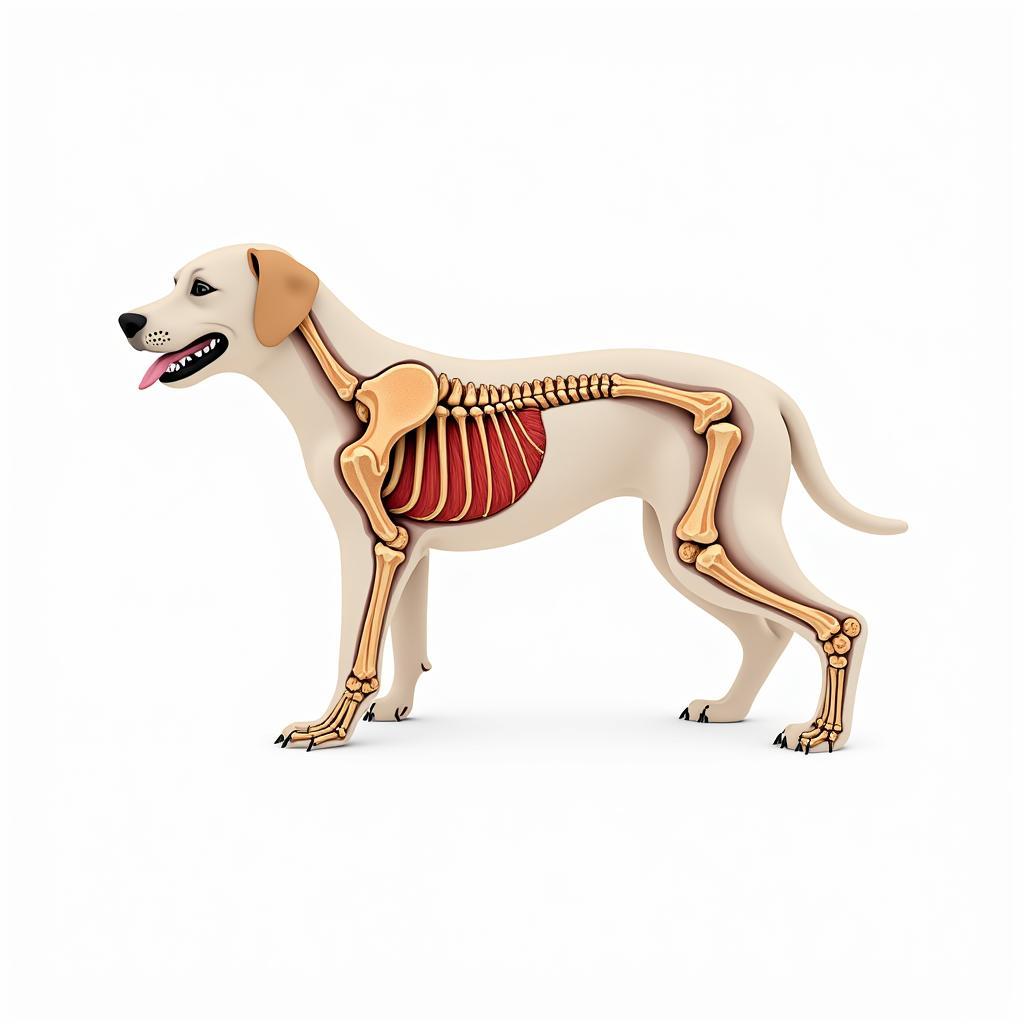As a loving dog owner, you want your furry friend to enjoy a long, active life full of tail wags and playful adventures. One crucial aspect of your dog’s overall well-being is maintaining healthy joints. Just like humans, dogs can experience joint pain and stiffness, especially as they age or if they are prone to certain breed-specific conditions. While regular exercise and maintaining a healthy weight are vital, providing your canine companion with the right nutrients can significantly impact their joint health. Let’s dive into the world of foods that can support your dog’s joint health and keep them feeling their best.
Understanding the Importance of Joint Health in Dogs
 Dog Joint Anatomy
Dog Joint Anatomy
Joints are crucial for movement, allowing your dog to run, jump, and play with ease. These complex structures rely on a delicate balance of cartilage, synovial fluid, ligaments, and tendons to function correctly.
- Cartilage: This smooth, rubbery tissue cushions the bones within a joint, preventing them from rubbing together and causing pain.
- Synovial fluid: This thick liquid acts as a lubricant, ensuring smooth movement within the joint.
- Ligaments: These tough, fibrous tissues connect bones to each other, providing stability and preventing excessive movement.
- Tendons: These strong cords attach muscles to bones, enabling movement and support.
When these components are compromised, your dog may experience joint stiffness, pain, inflammation, and reduced mobility. Several factors can contribute to joint problems in dogs, including:
- Age: Just like us, dogs experience wear and tear on their joints as they get older.
- Breed: Certain breeds, such as Labrador Retrievers, German Shepherds, and Golden Retrievers, are genetically predisposed to joint issues like hip and elbow dysplasia.
- Weight: Excess weight puts added stress on joints, increasing the risk of pain and damage.
- Injury: Trauma to a joint can lead to long-term problems if not properly managed.
- Nutrition: A diet lacking essential nutrients can weaken joint structures and contribute to inflammation.
Power Up Your Pup’s Plate: Key Nutrients for Joint Health
 Dog Enjoying a Meal
Dog Enjoying a Meal
Feeding your dog a balanced diet rich in joint-supporting nutrients is crucial for maintaining their mobility and comfort. Here are some key players:
1. Glucosamine and Chondroitin: The Building Blocks of Cartilage
These two powerhouses work in tandem to support cartilage health and reduce inflammation.
- Glucosamine: This amino sugar is a natural component of cartilage and plays a crucial role in its formation and repair.
- Chondroitin: This building block of cartilage attracts water to the joints, keeping them lubricated and cushioned.
While these compounds are naturally present in healthy cartilage, supplementing your dog’s diet with glucosamine and chondroitin can help support joint health, especially in older dogs or those with existing joint conditions.
2. Omega-3 Fatty Acids: Fighting Inflammation and Promoting Mobility
Omega-3 fatty acids, particularly EPA (eicosapentaenoic acid) and DHA (docosahexaenoic acid), are renowned for their anti-inflammatory properties.
- Reducing inflammation: Omega-3s can help manage inflammation in the joints, easing pain and improving mobility.
- Supporting cartilage health: These fatty acids may also help protect cartilage from further damage.
You can find omega-3s in fatty fish like salmon, mackerel, and sardines, or opt for supplements specifically formulated for dogs.
3. Antioxidants: Shielding Joints from Oxidative Stress
Free radicals, unstable molecules produced during normal bodily processes, can damage cells and contribute to inflammation. Antioxidants neutralize these harmful molecules, protecting your dog’s joints from oxidative stress.
- Vitamins C and E: These potent antioxidants can help protect joint tissues from damage.
- Selenium: This trace mineral works synergistically with vitamin E to combat free radicals.
Include antioxidant-rich fruits and vegetables in your dog’s diet, such as blueberries, cranberries, and carrots, or consider a supplement that includes these vital nutrients.
4. Lean Protein: Building and Maintaining Strong Muscles and Connective Tissues
Protein is essential for building and repairing all tissues in the body, including muscles, tendons, and ligaments, which are crucial for supporting healthy joints.
Choose high-quality protein sources like:
- Lean meats: Chicken, turkey, and fish are excellent sources of lean protein.
- Eggs: A great source of protein and other essential nutrients.
Ensure your dog’s diet provides them with adequate protein to maintain their muscle mass and support their joints.
Foods to Incorporate for Optimal Joint Health
Now that you understand the key nutrients, let’s explore some specific foods that can benefit your furry friend’s joint health:
- Fatty Fish: As mentioned earlier, fatty fish like salmon, mackerel, tuna, and sardines are packed with omega-3 fatty acids, making them a top choice for joint support.
- Bone Broth: This nutrient-rich broth is made by simmering bones, cartilage, and connective tissues, releasing glucosamine, chondroitin, and other beneficial compounds.
- Green-Lipped Mussels: These shellfish are a natural source of glucosamine, chondroitin, omega-3s, and antioxidants, making them a powerhouse for joint health.
- Eggs: Eggs provide a good source of protein and contain glucosamine and chondroitin in the yolk.
- Fruits and Vegetables: Many fruits and vegetables are rich in antioxidants. Consider incorporating blueberries, cranberries, apples (without seeds), sweet potatoes, carrots, and spinach into your dog’s diet.
Tailored Nutrition: Choosing the Right Dog Food for Joint Health
When selecting commercial dog food, look for options specifically formulated for joint health. These formulas often contain:
- Higher levels of glucosamine and chondroitin: Look for foods that list these ingredients on the label.
- Added omega-3 fatty acids: Check for the inclusion of fish oil or other sources of EPA and DHA.
- Antioxidant-rich ingredients: Foods containing fruits, vegetables, or specific antioxidant supplements can provide additional joint support.
Remember to consult with your veterinarian to determine the best diet for your dog’s individual needs, especially if they have existing joint conditions or food sensitivities.
Conclusion: Nourishing Your Canine Companion for a Life Full of Motion
Taking a proactive approach to your dog’s joint health can significantly impact their quality of life. By providing them with a balanced diet rich in joint-supporting nutrients, you can help them maintain mobility, manage pain and inflammation, and enjoy all the playful adventures life has to offer.
Remember, every dog is unique, and what works best for one may not work for another. Always consult with your veterinarian to determine the best course of action for your furry companion’s joint health.
FAQs: Frequently Asked Questions About Dog Joint Health and Food
1. Can I give my dog human glucosamine and chondroitin supplements?
It’s always best to use supplements specifically formulated for dogs, as human versions may contain ingredients that are harmful to canines.
2. How much fish oil should I give my dog for joint health?
The appropriate dosage of fish oil varies depending on your dog’s size, age, and health condition. It’s crucial to consult with your veterinarian to determine the correct dosage for your furry friend.
3. Are there any foods I should avoid feeding my dog if they have joint problems?
Foods high in fat, sugar, and processed ingredients can contribute to inflammation and weight gain, both of which can worsen joint problems. It’s best to avoid or limit these foods in your dog’s diet.
4. How can I tell if my dog’s food is helping their joint health?
Improvements in mobility, such as increased activity levels, less stiffness, and reduced pain or limping, can indicate that the food is positively impacting their joint health.
5. Are there any other ways to support my dog’s joint health besides diet?
Yes! Regular exercise, maintaining a healthy weight, joint supplements, and alternative therapies like acupuncture or massage can also be beneficial for your dog’s joint health.
For more information on choosing the right dog food for your furry friend’s specific needs, check out our articles on dog food Singapore and white fish and potato dog food.
If you’re looking for breed-specific recommendations, we have you covered! Explore our guides on the best dog food for standard poodle, best pork dog food, and working dog food.
Remember, your dog’s health is our priority! If you have any further questions or need assistance in choosing the perfect food for your canine companion, don’t hesitate to reach out. Contact our dedicated team at Phone Number: 02437655121, Email: minacones@gmail.com or visit us at 3PGH+8R9, ĐT70A, thôn Trung, Bắc Từ Liêm, Hà Nội, Việt Nam. We are here to support you and your furry friend 24/7.